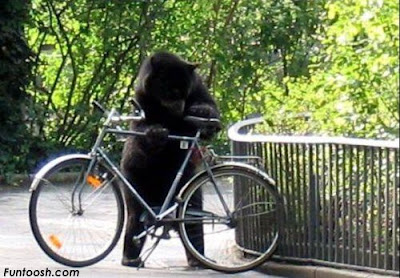I was intrigued by the headline: Woman Flees Police On Irrelevant Bicycle.
It got me to wondering: What, exactly, is an irrelevant bicycle? Is it one that can't be ridden anymore? Or is "Irrelevant" a brand? (Now that would be terrible marketing!)
Turns out, said velocipede matched the description of one that was stolen in Hilo, Hawaii. That is why cops pursued its rider--29-year-old Maria Duquette. I probably would have believed, as they did, that she stole the bike, which she used to lead the gendarmes in a wild chase through Hilo Town to the Hilo Bay Front. There, she ditched the wheels and jumped into the water.
She swam, and cops lost sight of her. A helicopter and boat search didn't yield any sign of her. Later, though, someone saw her on Coconut Island. She tried, again, to swim away, but officers pursued her into the ocean and took her into custody. She was charged with traffic violations related to the chase and disobeying an officer's direction.
So they got their perp. But, as it turned out, the bicycle wasn't the one that was reported stolen. I guess that's what the headline writer meant by "irrelevant"--to the investigation.
As some of you might know, newspaper headlines are almost never written by the person who wrote the article. I am sure that such was the case for the story and title I've linked. I feel sorry for whoever wrote the article: When I wrote for a newspaper, a few of my articles bore titles (not written by me, of course!) that were silly or even irrelevant.
It got me to wondering: What, exactly, is an irrelevant bicycle? Is it one that can't be ridden anymore? Or is "Irrelevant" a brand? (Now that would be terrible marketing!)
Turns out, said velocipede matched the description of one that was stolen in Hilo, Hawaii. That is why cops pursued its rider--29-year-old Maria Duquette. I probably would have believed, as they did, that she stole the bike, which she used to lead the gendarmes in a wild chase through Hilo Town to the Hilo Bay Front. There, she ditched the wheels and jumped into the water.
She swam, and cops lost sight of her. A helicopter and boat search didn't yield any sign of her. Later, though, someone saw her on Coconut Island. She tried, again, to swim away, but officers pursued her into the ocean and took her into custody. She was charged with traffic violations related to the chase and disobeying an officer's direction.
So they got their perp. But, as it turned out, the bicycle wasn't the one that was reported stolen. I guess that's what the headline writer meant by "irrelevant"--to the investigation.
As some of you might know, newspaper headlines are almost never written by the person who wrote the article. I am sure that such was the case for the story and title I've linked. I feel sorry for whoever wrote the article: When I wrote for a newspaper, a few of my articles bore titles (not written by me, of course!) that were silly or even irrelevant.





















